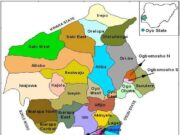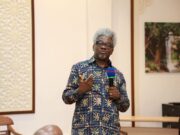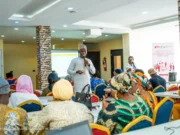A Vision for Oyo’s Industrial Transformation: A Comprehensive Summary of the Pathway to Progress
As we arrive at the 20th edition of this series, it is time to pause and reflect on the journey we’ve undertaken to explore how Oyo State can harness its vast potential to become a leading industrial powerhouse in West Africa. Through the last 19 editions, we’ve dissected and examined various aspects of Oyo’s infrastructure, resources, and culture, detailing how they can be harnessed to stimulate economic growth, create jobs, and transform the state into a global hub for industries ranging from agriculture to manufacturing, technology, and tourism.

The task at hand is monumental. Yet, the potential is just as great. From education and healthcare to energy, transportation, culture, politics, and resource management, the road to industrialisation lies in strategically tapping into each of these facets of Oyo State’s economy. This summary serves as an overview of the vision we’ve mapped out thus far, alongside a look at the next steps for Oyo’s industrialisation journey.

The Foundations of Oyo’s Industrialisation
To achieve the dream of an industrialised Oyo State, there are fundamental areas that need to be developed, starting with infrastructure. A modern, reliable infrastructure network is the backbone of industrialisation. We began by examining the importance of transportation infrastructure, with a focus on rail, road networks and more recently water ways. Effective transportation connects industries to markets, facilitates the movement of raw materials, and brings workers closer to factories. By creating a seamless flow of goods and people, Oyo can lay the groundwork for the efficient functioning of its industrial sector.
When we delved deeper into the role of rail infrastructure, Oyo’s geographical position makes it an ideal location for a rail network that can connect the state to the economic hubs of Lagos, Abuja, and other key parts of Nigeria. This rail infrastructure would lower transportation costs, increase trade flow, and provide the necessary framework for industrial development in the state.
However, infrastructure is more than just roads and rails. Oyo State also requires power to run its factories, offices, and homes. We therefore explored how reliable power supply is the lifeblood of any industrial revolution. While Oyo has some challenges in this regard, the state has the potential to leapfrog into the future by investing heavily in renewable energy sources, such as solar power, wind energy, and hydropower. These have never been more possible than they are today. By focusing on sustainable energy solutions, Oyo can create an energy-efficient environment for industries to thrive while also contributing to a cleaner planet.
Next, we examined water resources. We focused on the strategic role of water transportation and how Oyo can tap into its navigable water bodies, such as Ikere Gorge, Odo Ogun, and Eleyele Reservoir, to create a thriving water tourism industry. These water bodies also present opportunities for recreation, sports, and industrial development, particularly in aquaculture, agriculture, and even hydropower. These natural resources could be integrated into Oyo’s broader industrial plan to foster long-term economic growth.
Human Capital: Education, Healthcare, and the Workforce
The education sector plays a pivotal role in preparing a skilled workforce to meet the demands of an industrial economy. We discussed the importance of aligning Oyo’s education system with the needs of the future economy. The state’s education institutions, particularly the University of Ibadan and Ladoke Akintola University of Technology, are key to driving research and innovation. By strengthening the educational infrastructure and integrating vocational training into curricula, Oyo can produce the kind of skilled labour required for a rapidly industrialising society.
Healthcare is equally critical. As industries grow and urban populations increase, so do health challenges. We explored how healthcare infrastructure must evolve to support Oyo’s growing workforce and ensure a healthy, productive population. Investments in modern healthcare facilities, improved disease management and health insurance programs are essential for attracting both domestic and foreign investment. A healthy workforce is an efficient workforce, and by addressing healthcare challenges early, Oyo can enhance its attractiveness as a place to live and work.
Culture, Tourism, and the Role of Religious Institutions
Oyo State’s rich cultural heritage is a massive asset. We looked at the role religious institutions can play in industrialisation. These institutions can provide leadership in terms of ethical governance, social responsibility, and community-building. Their influence can also be pivotal in driving social change, encouraging sustainable practices, and promoting peaceful coexistence – all of which are vital for fostering a thriving industrial economy.
Similarly, Oyo’s culture and tourism are not just about preserving the past, but about using its rich history to fuel future growth. We discussed the potential of Oyo’s cultural assets from the Aso-Ofi weaving tradition in Iseyin to the twins festival in Ibarapa – as tools for attracting tourists and creating job opportunities. By combining culture with industrial growth, Oyo can develop a multifaceted economy that balances tradition with innovation.
Agriculture and Resource Management
As we explored agriculture which has always been a backbone of Oyo’s economy. However, to become a true industrial leader, the state must shift from traditional farming practices to modern agribusiness models. Investments in irrigation, agricultural technology, and processing are necessary to scale up production and make Oyo a key supplier in the global food market.
Additionally, mineral resources and land use are essential components of the state’s industrial strategy. Oyo’s wealth in natural resources, including minerals and fertile land, provides the raw materials necessary for both agriculture and industrial production. Harnessing these resources responsibly and sustainably can help create industries that feed into manufacturing and other sectors.
The Role of Politics in Oyo’s Industrialisation and Continuing the Industrialisation Journey
Throughout this series, we have consistently stressed the importance of political leadership in Oyo State’s industrialisation journey. Strong, visionary leadership that prioritises the development of infrastructure, education, healthcare, and social welfare is key to creating an environment conducive to industrial growth. In another Series, we also discussed the importance of private sector investment and the need for public-private partnerships to drive industrialisation.
Now, as we look to the future, it is time to turn our attention to the next phase of our exploration. The next topics will continue this journey towards transforming Oyo State into a regional industrial powerhouse:
Each of these topics will continue to explore the path to Oyo’s industrial transformation, offering actionable insights and solutions. The journey is far from over, but with each step, Oyo moves closer to a future of sustained growth, economic prosperity, and global recognition.
Call to Action: What Citizens Can Do Today
– Engage in community-driven development: Advocate for infrastructural projects that benefit your locality and create a ripple effect across the state.
– Invest in skills development: Participate in training programs that equip you with the skills needed to thrive in an industrial economy.
– Support local industries: Buy from local manufacturers, invest in local agriculture, and encourage homegrown businesses.
– Hold leaders accountable: Ensure that the promises made regarding infrastructure, health, and education are realized for the benefit of the entire state.
The future of Oyo State is bright. The path to industrialisation is challenging, but with the collective effort of its leaders, citizens, and industries, Oyo can rise to become one of Africa’s most prosperous regions.
Amofin Beulah Adeoye











































